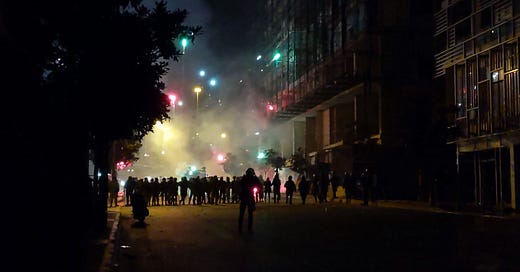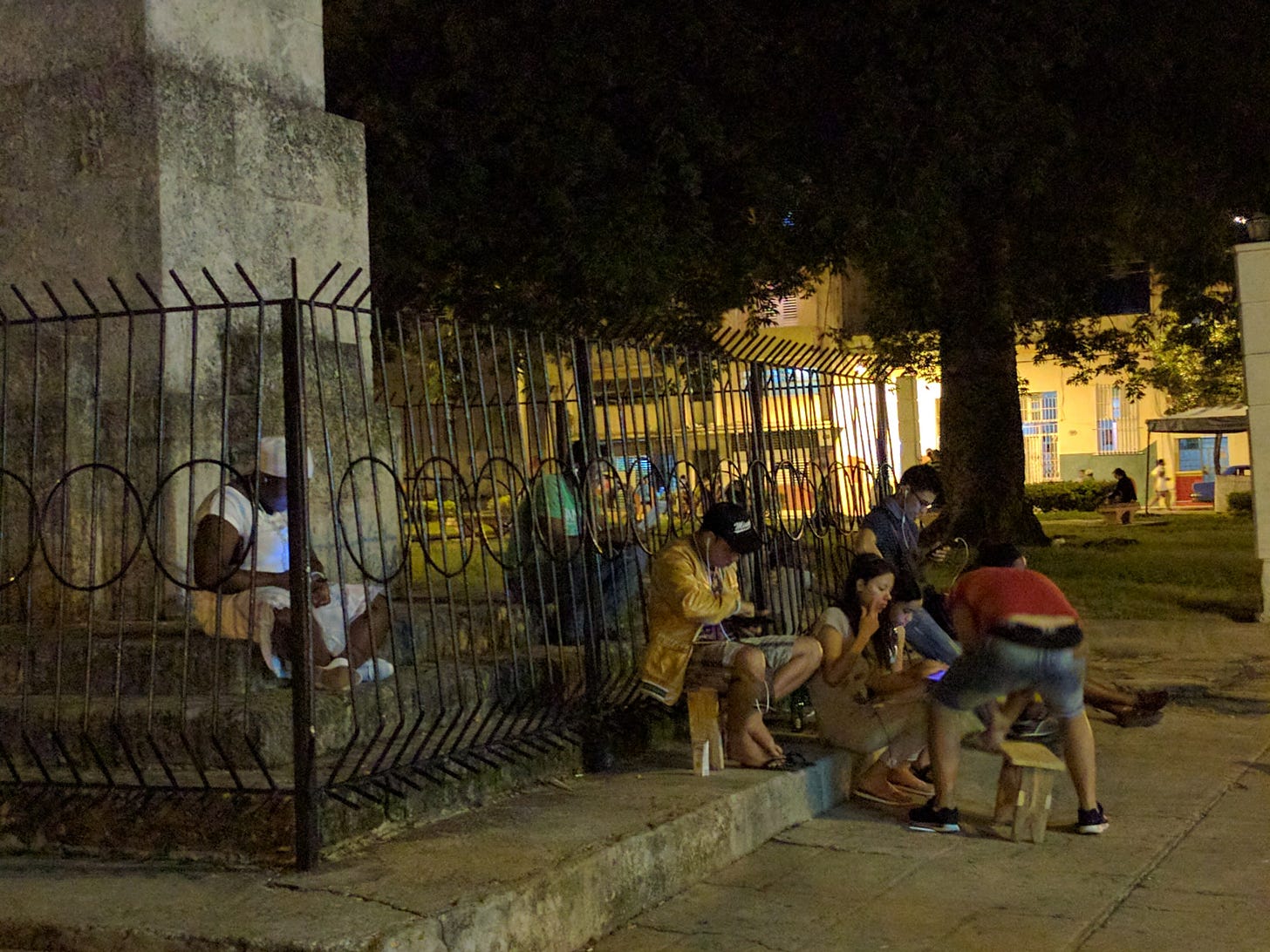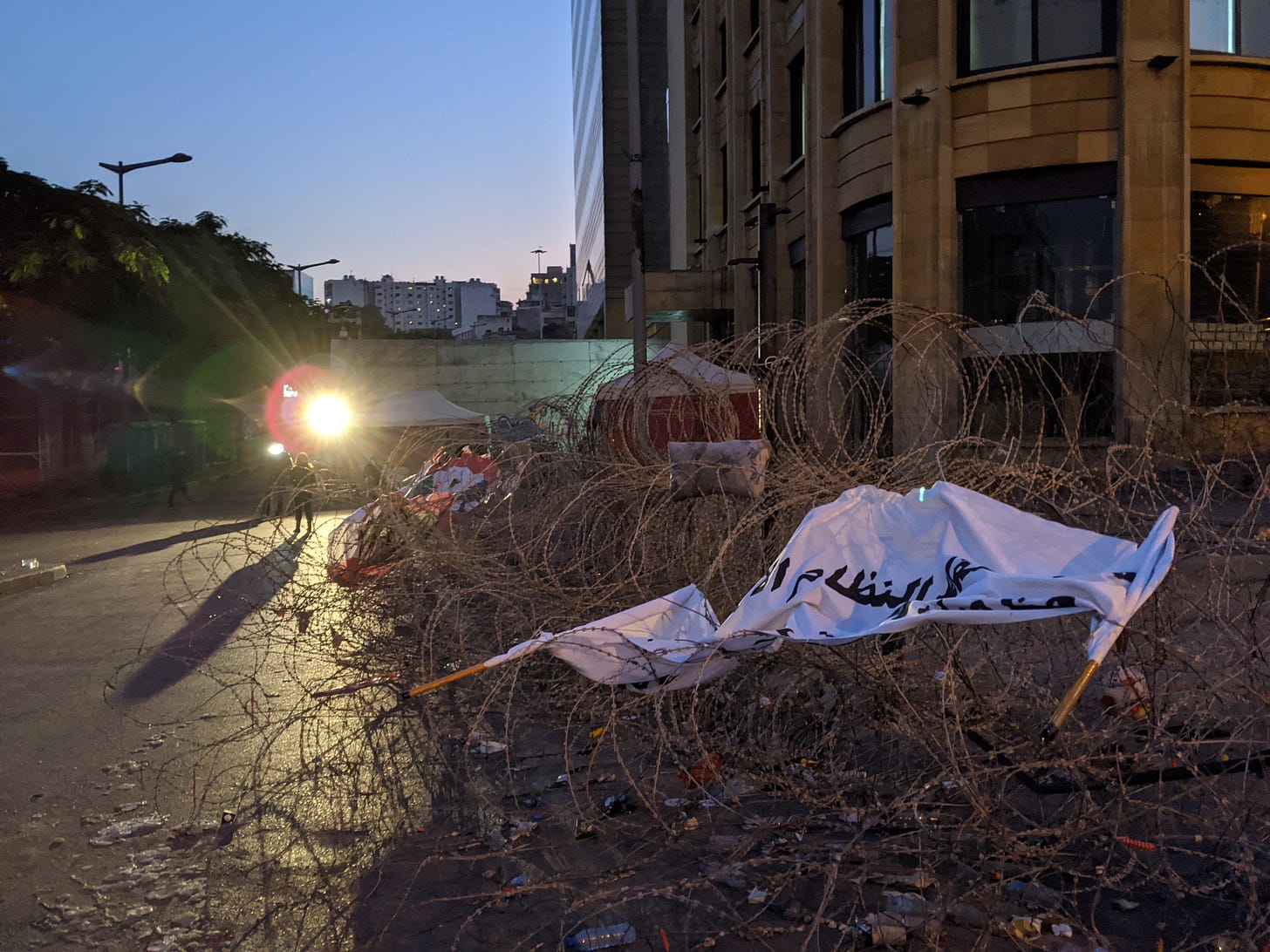
Happy Thanksgiving, all (at least, my American readers 🦃🦃🦃), I hope you’re reading this somewhere cozy and coma’d with loved ones. Of course after announcing I’d release a newsletter every Thursday, I realized we’re already on a “Thursday is a national holiday” week — so here we are, Friday! Rules are made to be broken.
(Also, because I’ve been asked — all photos in this newsletter are my own, unless credited otherwise. Though the GIFS sadly are not! They’re a ~gift of the internet~, mostly from giphy.com.)
Before we look at what’s happened in Cuba since the expansion of mobile data access in 2019, let’s wend a brief detour through the historical relationship between information and revolution. It’s no coincidence that governments have a rich history of restricting internet access to assert political control, whether through ongoing censorship and limited access — as in the cases of Cuba, China, and North Korea — or through temporary internet shutdowns and limitations in times of crisis or protest, as has happened in Egypt, Turkey, and India. And many others besides those.
Why ask this now? We’ll discuss more next week, but Cuba saw a tremendous increase in protest activity during the pandemic, especially leading up to the July 2021 protests. These resulted in thousands of imprisonments, numerous injuries and at least one death. And while it can’t be claimed the protests occurred because of the expansion of internet access in 2019 — COVID-19’s impact on the Cuban economy, health, and food supplies was surely a major cause — the internet almost certainly played some role in both helping Cubans.
Two major questions come out of this. Can the internet, and other media technologies like it, increase citizens’ likelihood of…
Deciding to protest — impacting their opportunity / availability? and
Organizing to do so — impacting their tactical / instrumental success?
And does history agree this has generally been the case — not just with the internet, but other information media like books, newspapers, radio, television, and more?
These are obviously huge questions — like, numerous people have likely written numerous dissertations about it, dissertations I was too lazy to find and read right now. Not to mention, Clay Shirky and Evegeny Morozov hashed out some of this ~14 years ago, but a lot has changed since. So let’s take a stab at it anyway!
In all seriousness, this discussion will not do anything resembling justice to this topic, but a little peek won’t hurt much, I hope.
Pamphlets & Books (The “OG TikTok”)
I’ve always been much more a “book guy” than a “tech guy”, and it took me years to reconcile this fact with my deep interest in the internet. But when you boil it down, the “internet” really is just a big set of interconnected message lines, and an interconnected series of books — or at least, book-like documents, tweets, and posts. And now photos, videos, and music — the microfiche, VHS and CD libraries of our digital age, if you will. This is why some people (usually in governments, NGOs and parts of academia) refer to the mishmash of phones and internet technology as “ICT”s, for Information and Communication Technologies.
So anyway, books have been around a long time — and inspiring people, and pissing off others, for just as long! Martin Luther famously used the printing press to disseminate informational pamphlets leading up to the Protestant Reformation. And the Library of Congress describes how Thomas Paine’s Common Sense helped drive revolutionary sentiment in the early United States:
“With over half a million copies in twenty-five editions appearing throughout the colonies within the first year, this popular pamphlet helped to turn the tide of sentiment toward revolution.”
I found it surprisingly hard to find research linking historic texts to protest and revolutionary movements. But I don’t actually think this should be so surprising — one can argue that protest movements (and revolutions beyond them) are forms of politics, and spring primarily from shifts in culture — ideas around the reasons, probably efficacy, and ability to protest. Much as I detest his views, Andrew Breitbart (the namesake of Breitbart News) famously said “politics is downstream from culture,” and it’s an idea I’m increasingly convinced of.
It’s incredibly hard to tie those things together though — culture can change slowly, wiggle-ly, and somewhat invisibly, and it’s rarely easy to say “these people read or heard or saw this idea, and then weeks, or months, or years later, did this thing related to the idea.”
At the very least, the consistent suppression of books and ideas by powers-that-be should indicate that powerful people and groups at least believe these things can lead to dissent. I won’t dig deep here, but Canada’s Freedom to Read has compiled a wonderful list of landmark “book bannings and burnings through history”. A tragic number of the examples come from recent US history — and more will likely be added soon 😬— but the list starts with this spicy example from early China:
“259–210 B.C.: The Chinese emperor Shih Huang Ti is said to have buried alive 460 Confucian scholars to control the writing of history in his time. In 212 B.C., he burned all the books in his kingdom, retaining only a single copy of each for the Royal Library, and those were destroyed before his death. With all previous historical records destroyed, he thought history could be said to begin with him.”
Newspaper, Radio & Television (“Millennial TikTok”)
Similar to how some link Thomas Paine’s Common Sense to the American Revolution, Todd Andrlik, author of Reporting the Revolutionary War, states that:
“Newspapers were absolutely pivotal in making America. As the only mass media at the time, they fanned the flames of rebellion, sustained loyalty to the cause and ultimately aided in the outcome.”
He even goes so far as to say,
“Without newspapers, there would have been no American Revolution.”
Way to bring that big claim energy, Todd!
A fascinating 2001 paper examines the impacts of radio technology on a very specific period and place in history, textile worker insurgency in the southern US from 1929 to 1934:
“Using historical data on textile manufacturing concentration and strike activity, FCC data on radio station foundings, and analysis of political content and song lyrics, the authors show that the geographic proximity of radio stations to the ‘textile belt’ and the messages aired shaped workers’ sense of collective experience and political opportunity. Walk-outs and strike spillover over mill towns resulted.”
So workers more likely to hear political messages and songs on the radio were more likely to protest — and more likely to bring those protests to towns near them.
And of course, the proliferation of partisan radio — particularly on the American right, and especially Rush Limbaugh, Fox News, and the like — can be seen as means of influencing culture to then influence politics. Whether those politics show up in protest movements, elections, or the January 6th insurrection.
To take an even darker turn, significant research has investigated the role of RTLM (Radio Télévision Libre des Mille Collines, a Rwandan radio station that existed for a single year from 1993 to 1994) in driving motivations for the Rwandan genocide. While most of these stop short of tying a direct, sole causal link from RTLM broadcasts to the horrific actions of 1994, most seem to believe radio played some role in building hatred, unifying participants, and outlining action. The UN agrees it’s impossible to place sole responsibility for the genocide on RTLM, but nevertheless wrote that “RTLM clearly played a role in promoting the killings.”
The Internet (Actual, um, TikTok)
Phew, on to the internet! Time for something light after that.
It’s probably no surprise, but there’s lots of research and books examining the role that the internet plays in driving and organizing protest movements.
The US government certainly seemed to believe increased social media access could lead to more democracy — in Cuba no less, through its relatively covert creation of ZunZeo, a Twitter-like app designed for the Cuban population.
And the authors of the book chapter “Is the Internet Creating New Reasons to Protest?” write:
“Is the Internet fostering new identities, new grievances, new stakes in protest, and/or new terrains of contention? Is it contributing not only to the supply of protest but also to the demand for it? We argue that it is.”
So a lot of people (though not all) think the internet can lead to protest, and from there possible revolution — or at least, the desire to protest. But what about protests themselves — can the internet make them more effective than they’d otherwise be?
That is, what about the instrumental, tactical effects of the internet on protest and revolutionary movements?
When I was in graduate school (prompting my whole “so am I a book guy or tech guy?” identity crisis), the Arab Spring ramped up, and then Edward Snowden leaked a bunch of top-secret documents through WikiLeaks and well, it was a very exciting and optimistic time to think about all this stuff. Journalists (and policy wonks, and academics, and politicians, and almost everyone) gushed about the Twitter Revolutions and Wikileaks Revolutions. The thinking among many then was, that social media would almost inevitably bring democracy and joy to everyone from Iran to Syria to Egypt to Libya. Needless to say, those revolutions didn’t turn out as well as most of us hoped, and many since have tried to figure out just what went wrong.
Zeynep Tufekci discusses at length the hopes and failures of social media to organize effective protest in her book, Twitter and Tear Gas. Tufekci is from Turkey, and describes her own experience with social media organizing amidst the Gezi Park protests of Istanbul in 2013. She examines the role of communication technologies in other protest movements around the world as well, and isn’t rosy about the prospects for social media to make protest movements more effective.
The whole book is worth reading, but this excerpt captures one particularly noteworthy point:
“...the ability to use digital tools to rapidly amass large numbers of protesters with a common goal empowers movements. Once this large group is formed, however, it struggles because it has sidestepped some of the traditional tasks of organizing. Besides taking care of tasks, the drudgery of traditional organizing helps create collective decision-making capabilities, sometimes through formal and informal leadership structures, and builds a collective capacity among movement participants through shared experience and tribulation. The expressive, often humorous style of networked protests attracts many participants and thrives both online and offline, but movements falter in the long term unless they create the capacity to navigate the inevitable challenges.”
In a nutshell, the internet makes it a lot easier for people to protest — but maybe the challenge of creating a protest movement is kind of the point? My big takeaway from Tukefci’s book is that the act of protesting, historically, has been a means of showing the power of a protest movement. But up until the internet, protest movements had to build that power through the hard work of community and coalition building, and the internet “click a button to show your support”-style of protest rings hollow to those in power. As, one might argue, it likely should.
So What?
Phew, this one got long! Thanks for hanging in there if you’re still around.
There’s not a nice, clean summary of all this, sadly. But if I had to write down a few conclusions, these would be them:
Can the internet, and information technology (books, radio, TV, and the like) create a desire to protest, and lead to more protests and political action — even revolutions? Probably some, yes.
Can the internet and other communication technologies make those protests, political actions, and even revolutions more effective? Probably some, but less than we hoped?
Like any big question, this one’s murky and kind of just leads to a lot of writing and finally a big 🤷. Sorry!
Finally, I’m writing this in November of 2023, amid ongoing protests, and counter-protests, and Tweets and TikToks and counter-Tweets and -TikToks, and TV talking heads and podcast talking mouths and televised speeches and more, surrounding the violent conflict between Israel and Palestine. Even if we ignore all the research and books I linked to above, it’s pretty hard to say the internet isn’t playing some role in ginning all this up, right?
Thanks, and see y’all next week.
Song of the Week: You Won’t — “Revolutionaries”









